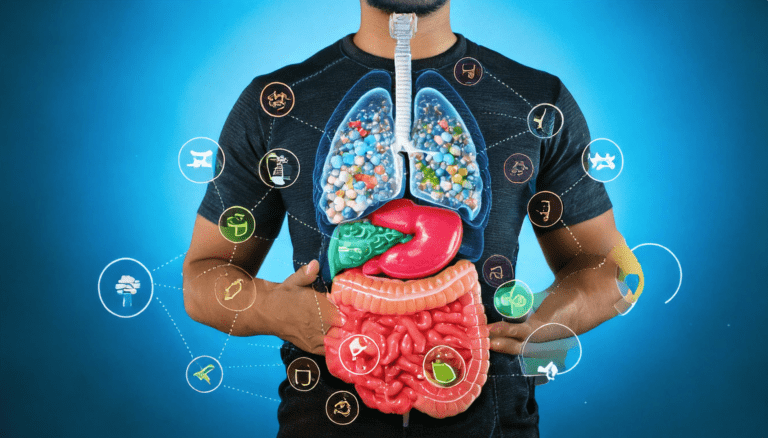Artificial sweeteners and gut health are becoming a topic of increasing concern as more research reveals how these sugar substitutes can impact the gut microbiome. In this article, we’ll explore the effects of popular sweeteners like sucralose and aspartame on gut health and discuss healthier alternatives like stevia and monk fruit
Summary
Artificial sweeteners, such as sucralose and aspartame, can disrupt gut bacteria and lead to inflammation, digestive issues, and potential glucose intolerance. For better gut health, natural sweeteners like stevia or monk fruit are safer alternatives with minimal impact on the microbiome.
How Artificial Sweeteners Interact with the Gut Microbiome
The gut microbiome is made up of trillions of bacteria, fungi, and other microorganisms that live in your digestive system. These microorganisms are essential for breaking down food, absorbing nutrients, and regulating your immune system. A balanced microbiome promotes overall health, while an imbalanced one can lead to digestive issues, weight gain, and even conditions like Type 2 diabetes.
Artificial sweeteners have been found to disrupt the delicate balance of the gut microbiome. Research shows that sweeteners like sucralose and aspartame can alter the composition of gut bacteria, reducing the number of beneficial microbes and increasing harmful ones. These changes in gut bacteria can lead to inflammation, digestive discomfort, and a weakened immune response. Moreover, an imbalanced microbiome may even affect your ability to control blood sugar, which is particularly concerning for people with diabetes.
In a study published in Nature, researchers found that long-term consumption of artificial sweeteners caused significant changes in gut bacteria, leading to glucose intolerance in both mice and humans. This highlights the potential impact of sweeteners not only on the gut but also on broader metabolic functions, including blood sugar regulation.
Common Artificial Sweeteners and Their Effects on Gut Health
Different artificial sweeteners have varying effects on the gut. Here’s a breakdown of how some of the most popular sweeteners impact gut health:
| Sweetener | Effect on Gut Health | Common Use |
|---|---|---|
| Aspartame | May alter gut bacteria, causing inflammation | Diet sodas, sugar-free products |
| Sucralose | Linked to reduced beneficial bacteria | Baked goods, sugar-free drinks |
| Saccharin | May cause imbalances in gut microbiome | Sweeteners, low-calorie foods |
| Acesulfame K | Shown to affect gut bacteria in animal studies | Sodas, sugar-free snacks |
| Stevia | Minimal effect on gut health, natural alternative | Natural sweetener, healthy foods |
- Aspartame: Found in diet sodas and low-calorie snacks, aspartame can lead to gut bacteria imbalances that trigger inflammation and digestive problems. Some studies also suggest it may increase the risk of metabolic disorders when consumed long-term.
- Sucralose: Widely used in baked goods and sugar-free beverages, sucralose has been linked to a reduction in beneficial bacteria in the gut. This imbalance may lead to digestive issues such as bloating, gas, and altered bowel movements.
- Saccharin: Although it is one of the oldest artificial sweeteners, saccharin still raises concerns about its impact on the gut microbiome. Studies show it may cause microbial imbalances that could increase the risk of metabolic problems and weight gain.
- Acesulfame K: Used primarily in sodas, this sweetener has shown similar gut-disrupting effects in animal studies. More research is needed to understand its impact on humans.
- Stevia: As a natural sweetener, stevia has a much smaller effect on gut bacteria and is considered a safer alternative for maintaining gut health. It is often used by those who prefer plant-based options over artificial sweeteners.
The Link Between Gut Health and Blood Sugar
There is a direct connection between gut health and blood sugar regulation. An imbalanced gut microbiome can impair the body’s ability to manage glucose, leading to increased blood sugar levels and insulin resistance. This is particularly concerning for individuals with diabetes or pre-diabetes who rely on artificial sweeteners to reduce their sugar intake.
A healthy gut microbiome helps regulate metabolism by breaking down carbohydrates and controlling the release of glucose into the bloodstream. When artificial sweeteners disrupt the gut bacteria, this metabolic process becomes less efficient, potentially leading to glucose intolerance. Studies suggest that this disruption can increase the risk of developing metabolic disorders such as Type 2 diabetes.
For diabetics, maintaining a balanced gut microbiome is essential for controlling blood sugar levels. The overuse of artificial sweeteners, which can damage gut health, may inadvertently cause blood sugar spikes—negating the very purpose of using these sugar substitutes.
Are Natural Sweeteners Better for Gut Health?
While artificial sweeteners can disrupt gut bacteria, natural sweeteners like stevia and monk fruit are generally much gentler on the gut microbiome. Both stevia and monk fruit extract are derived from plants, and studies have shown that they do not significantly alter gut bacteria or cause inflammation.
Stevia, in particular, has gained popularity as a natural alternative to artificial sweeteners. It is not only zero-calorie but also does not raise blood sugar levels, making it an excellent choice for people with diabetes. Furthermore, its minimal impact on gut health makes it a safer option for those concerned about maintaining a healthy microbiome.
For those who want to enjoy sweetness without compromising their gut health, switching from artificial to natural sweeteners can be a beneficial step. However, even natural sweeteners should be consumed in moderation to avoid potential side effects.
Practical Tips for Using Sweeteners Without Harming Gut Health
If you’re concerned about how sweeteners might be affecting your gut, there are several ways to mitigate their impact:
- Moderation is Key: Whether you’re using artificial or natural sweeteners, always consume them in moderation. Excessive use of any sugar substitute can disrupt gut health.
- Try Natural Sweeteners: Consider switching to stevia or monk fruit, which are less likely to cause gut imbalances.
- Diversify Your Diet: A diverse diet rich in fiber, fruits, and vegetables can support a healthy gut microbiome. Incorporating probiotic-rich foods like yogurt, kimchi, or kombucha can help restore balance to your gut bacteria.
- Monitor Your Body: Pay attention to how your body reacts to specific sweeteners. If you experience digestive discomfort or other side effects, try reducing your intake or switching to a different type of sweetener.
Frequently Asked Questions (FAQs)
- Can artificial sweeteners harm gut health?
Yes, studies have shown that certain artificial sweeteners can disrupt the gut microbiome, reducing the number of beneficial bacteria and increasing harmful ones. - Which artificial sweeteners are the worst for gut health?
Sweeteners like sucralose, aspartame, and saccharin have been linked to negative changes in gut bacteria, which can lead to digestive issues. - Are natural sweeteners better for gut health?
Yes, natural sweeteners like stevia and monk fruit have a much lower impact on gut bacteria and are considered safer for long-term use. - How do sweeteners affect blood sugar?
While artificial sweeteners don’t directly raise blood sugar, their impact on the gut microbiome may lead to insulin resistance and glucose intolerance over time.
Conclusion
Maintaining a healthy gut is essential for overall well-being, and the use of artificial sweeteners can disrupt this balance. While these sugar substitutes offer benefits like low-calorie content and blood sugar control, their potential impact on gut bacteria should not be ignored. Opting for natural sweeteners like stevia or monk fruit can help protect your gut health while still allowing you to enjoy sweet flavors. Moderation and dietary diversity are key to minimizing any negative effects and ensuring that your gut microbiome remains balanced.
Sources and Citations
Nature Study on Artificial Sweeteners and Gut Microbiome
A recent study published in Nature investigated the effects of artificial sweeteners on the gut microbiome, the complex community of bacteria and other microorganisms that reside in the digestive tract. The findings suggest that artificial sweeteners may disrupt the balance of gut bacteria, potentially leading to negative health consequences.
Nature Study
The Role of Gut Bacteria in Health
The gut microbiome plays a crucial role in various aspects of health, including digestion, nutrient absorption, and immune function. Imbalances in the gut microbiome, known as dysbiosis, have been linked to several health conditions, such as obesity, diabetes, and inflammatory bowel disease.
[American Gut Project]
Artificial Sweeteners and Gut Health
While more research is needed to fully understand the long-term effects of artificial sweeteners on gut health, some studies suggest that they may contribute to dysbiosis. One potential mechanism is through the selective growth of certain types of gut bacteria that are resistant to artificial sweeteners.
Journal of Clinical Nutrition
Gut Health and Diabetes Management
The National Institute of Diabetes and Digestive and Kidney Diseases (NIDDK) recognizes the importance of gut health in diabetes management. The gut microbiome plays a role in regulating blood sugar levels and insulin sensitivity. Maintaining a healthy gut microbiome may help individuals with diabetes better control their condition.
NIDDK





